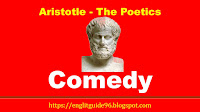Aristotle
- The Poetics
Views on Poetic Truth
According to Aristotle, poetry expresses the
universal element in human nature and in life. As a revelation of the universal
it abstracts from human life much that is accidental. It liberates us from the
tyranny of physical surroundings. It can disregard material needs and animal
longings. Thought disengages itself from sense and makes itself supreme over
things outward. ‘It is not the function of the poet’, says Aristotle, ‘to
relate what has happened, but what may happen. The poet and the historian
differ not by writing in verse or in prose. The true difference is that one
relates what has happened, the other what may happen. The first distinguishing
mark, then, of poetry is that it has a higher subject matter than history: it
expresses the universal, not the particular, the permanent possibilities of
human nature, it does not merely tell the story of the individual life. History
is based upon facts and with these it is primarily concerned; poetry transforms
its facts into truths.
Poetry
v/s History
The purpose
of The Poetics makes it clear that poetry is not a mere reproduction of a
picture of life with all its trivialities and accidents. The world, which
poetry creates, is more intelligent than the world of experience. The poet
presents permanent and eternal facts, free from the elements of unreason which disturb
our comprehension of real events and of human conduct. In fashioning his
material, he may transcend nature, but he may not contradict her; he must not
be disobedient to her habits and principles. He may recreate the actual, but he
must avoid the lawless, the fantastic, and the impossible. Poetic truth passes
the bounds of reality, but it does not violate the laws which make the real
world rational. Thus, poetry acquires an ideal unity that history never
possesses. History is never wholly eliminated from a record of actual facts.
Poet,
Poetry and History
Aristotle
first considers the nature of the poetic art. Following Plato, he calls the
poet an imitator, like a painter or any other artist who imitates one of three
objects - ‘things as they were or are, things as they are said or thought to
be, or things as they ought to be’: in other words, what is past or present,
what is commonly believed and what is ideal. Like Plato too, he believes that
there is a natural pleasure in imitation which is an inborn instinct in man, constituting
the one difference between him and the lower animals. It is this pleasure in
imitation that enables the child to learn his earliest lessons in speech and
conduct from those around him. They are imitated by him because there is
pleasure in doing so. A poet or an artist is just a grown-up child indulging in
imitation for the pleasure it affords. But the poet’s imitations or picture of
life are not unreal - ‘twice removed from reality’- as Plato believed. On the
contrary, they reveal truths of a permanent or universal kind. To prove this
Aristotle institutes a comparison between poetry and history. It is not the
function of the poet to relate what has happened, but what may happen. The poet
and the historian differ not by writing in verse or in prose. The true
difference is that one relates what has happened, the other what may happen.
Poetry is a more philosophical and a higher thing than history: for poetry
tends to express the universal, history the particular. History records
particular persons, places or things: poetry infuses a universal appeal into them
by stressing what they have in common with all persons, all places or all
things in the same circumstances. The pictures of poetry are not mere
reproduction of facts but truths embedded in those facts that apply to all
places and times.
Poetry
is Universal
‘Poetry
is more philosophical and a higher thing than history’, and ‘higher in scale’.
Poetry reveals a higher truth than history and is nearer to philosophy. Though
it has a philosophical character it is not philosophy: ‘It tends to express the
universal’. The aim of poetry is to represent the universal through the
particular, to give a concrete and the living embodiment of a universal truth.
Poetry-
Pleasing and Appealing
The
function of poetry is to please. Hence poetry should be pleasing both to the
poet and the reader. Besides, poetry makes an immediate appeal to the emotion.
Taking tragedy as the highest form of poetry, he says that it arouses the
emotions of pity and fear-pity at the undeserved sufferings of the hero and
fear of the worst that may befall him. Everybody has occasions of fear and pity
in life. In tragedy where the sufferings we witness are not our own, these
emotions find a fuller and free outlet. It is this that pleases in a tragic
tale which normally will be painful. The emotional appeal of poetry is not
harmful as Plato believed but health-giving and artistically satisfying.






















0 Comments